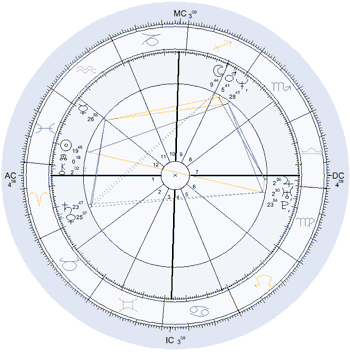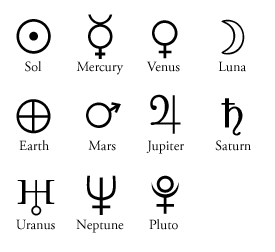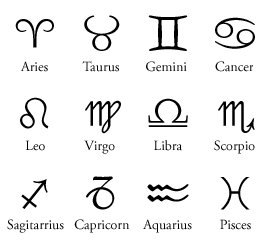Astrology
(Revision as of 05:24, 23 Jun 2013)
Categories: Astrology | Systems | Divination
Part of the Magick in Theory & Practice series.
Many of those who practice astrology believe that the positions of certain celestial bodies either influence, or correlate with but do not influence, people's personality traits, important events in their lives, and even physical characteristics.
For many astrologers the purported relationship between the celestial bodies and events on earth need not be causal, nor even scientific. Although there are astrologers who try to put astrology on sound scientific principles, for many more it is a technology and an art that merges calculations with intuitive perceptions. Some believe that the core principles of astrology are based upon the ancient Hermetic maxim: As Above, So Below.
| Table of contents |
Description
In past centuries astrology often relied on close observation of astronomical objects and the charting of their movements, which might be considered a protoscience in this regard. In modern times astrologers have tended to rely on data drawn up by astronomers and set out in a set of tables called an ephemeris which shows the changing positions of the heavenly bodies through time.
Central to all astrology is the natal chart (other names for this diagram in English include horoscope, natus, nativity, astrological chart, map, birth chart, cosmogram, or simply chart). This is a diagrammatic representation in 2 dimensions of the celestial bodies' apparent positions in the heavens from the vantage of a location on Earth at a given time and place. Interpretation of a natal chart is governed by:
- Astrological aspects: the positions of the heavenly bodies relative to each other.
- Their positions relative to the astrological signs of the zodiac.
- Their positions relative to the horizon (the ascendant), zenith and nadir, and in one of the systems of astrological houses.
Common traditions of astrology include Western astrology, Chinese astrology, Jyotish (Vedic astrology) and Kabbalistic astrology. All of these can be subdivided by type, such as natal astrology (the study of a person's birth, or natal chart), horary astrology (a chart drawn up to answer a specific question), and electional astrology (a chart drawn up ahead of time to determine the best moment to begin an enterprise or undertaking). Mundane astrologers believe correlations exist between geological phenomena (such as earthquakes, volcanic eruptions, etc.) and astronomical phenomena (the movement of celestial bodies in relation to Earth). Political astrology has existed for thousands of years as well, while some astrologers use ancient methods that are supposed to be able to predict the weather and weather-related phenomena (storms, floods, etc.), which is collectively known as meteorological astrology.
A few Western but all Jyotish (Hindu) astrologers use the sidereal zodiac that uses the true astronomical positions of the stars. The majority of Western astrologers base their work on the tropical zodiac that uses a view of the heavens as seen 2000 years ago.
Overview
 |
| The Zodiac
Aries (♈) The Planets Sun (☉) Other components |
Astrology provides a direct link to some of the longest held human beliefs. Its continued appeal may rest on its ability to link an individual's life to the wider cosmos and so give a feeling of uniqueness, meaning and of connection to the totality of things. Astrology also makes use of basic, archetypal qualities found universally throughout humanity, and some people find it a useful intuitive tool with which to describe themselves, others, and the relationships between them.
Most serious astrologers scorn trivial horoscope predictions supplied by newspapers as nothing but a way to entertain readers. Serious astrologers see all popular astrology in which people are labeled on the basis of their sun sign alone as frivolous and not worthy of defense. The sun sign is regarded as but one of many factors, which must be taken into account when interpreting one's horoscope.
An individual astrological reading by a skilled astrologer—or by the individual himself or herself if he or she is well-versed enough in astrology—is thought to provide a way for the individual to divine his or her own feelings about the present, and to better understand his or her own personality. This can give the individual the opportunity to understand those feelings and patterns of behavior, which may be barriers to possible futures, and so change their actions in the present to bring about a desired future. In this respect it is more closely linked to tarot, I Ching and modern psychotherapy than to astronomy.
An individual is always seen as the ultimate master of their destiny, and given sufficient will and purpose, as being able to overcome the most adverse astrological indications. However, the degree of struggle necessary will depend on the astrological circumstances in which they enact their project.
Most astrologers make no claim to be practicing a science and see their skill as an art, which gives a structure to a dialogue with their client. An astrologer's success would need to be measured in terms of the happiness and well being of their subjects rather than the mechanical prediction of events. Astrology has, however, taken on new astronomical concepts as they have been discovered and added its own symbolism to them. Thus the outer planets discovered since 1781, because of their slow movement across the zodiac, sit in the same position in the charts of whole generations. They have been assigned a role in interpreting the processes of large groups; of nations, institutions, ideas, beliefs and the generations themselves.
The 12-sign astrological zodiac has been in place for well over 2000 years and is still used by most Western astrologers, while Ophiuchus has only been located along the astronomical ecliptic for the past 75 years or so. In astrology, the size of the actual astronomical constellations is a non-issue because most Western astrologers use the tropical zodiac, where the ecliptic is divided into 12 equal portions exactly 30 degrees each to get the 12 astrological signs. (12 signs x 30 degrees each sign = the 360 degrees of the ecliptic) The beginning of the astrological year is the beginning of Spring in the Northern Hemisphere (the vernal equinox) and not when the Sun crosses an arbitrary dividing line drawn up in modern times to denote where the sign of Aries begins.
Elements of astrology
Unlike the daily horoscope in the newspaper, astrology is very complex with many components. These include (but are not limited to): the planets, the 12 signs of the Zodiac, aspects, houses, elements (air, earth, fire, & water), qualities (cardinal, fixed, & mutable), the ascendant, retrograde motion, other heavenly bodies (asteroids, fixed stars, & large moons), transits and returns, orbs, equinoxes & solstices. Below are brief descriptions of the major components.
For a more detailed discussion of the technical aspects of astrology, see Components of Astrology.
The Planets
The planets include the seven "classical" planets—Sol, Mercury, Venus, Luna, Mars, Jupiter, and Saturn—plus the modern additions of Uranus, Neptune, and Pluto. The following is a general description of their characteristics:
- Sun—the inner core of a person or situation, the deepest self and influential power.
- Mercury—reason, intelligence; writing, orderliness, education, skill.
- Venus—beauty, allure, pleasure, relationships and eroticism.
- Luna—feelings and emotions; illusion; imagination.
- Mars—action, spontaneity, aggression, and drive.
- Jupiter—expansiveness and growth; justice, fortune.
- Saturn—discipline, responsibility, limitations, and resistance; law and order; caution and reserve.
- Uranus—technology, the future, science, innovation, radical change, the unexpected.
- Neptune—inspiration, spirituality, magick, enchantment, dreams, altered states.
- Pluto—power, metamorphosis, change and rebirth, cycles of dying and becoming.
Retrograde Motion
At times, because of an elliptical orbit, some planets appear to move backwards in the sky. This backwards movement is referred to as "retrograde" motion. There is no consensus regarding the effects of a planet going retrograde, although some astrologers believe it does have a general affect on a planet's influence.
The Zodiac
The Zodiac refers to the twelve constellations that fall on the plane of the ecliptic (the path the sun takes across the sky over the course of the year). The following is a general description of their characteristics:
- Aries—"I want," action oriented, pioneering, assertive, enthusiasm, competitive
- Taurus—"I have," sensual, cautious, stubborn, physical
- Gemini—"I think," curious, talkative, sociable, duality, mercurial, intelligent
- Cancer—"I feel," sensitive, tenacious, family and home oriented, helpful, nurturing, moody
- Leo— "I am," passionate, dramatic, independent, noble, leader, egotistical, selfish
- Virgo—"I serve," practical, analytical, work and service oriented, critical, common sense, orderly
- Libra—"We are," partnerships, balance, grace, charm, cooperative, social, ideas, lazy, kidneys/lumbar
- Scorpio—"I desire," intense, controlling, sexual, compulsive, deep, secretive, mysterious, obsessive
- Sagittarius—"I seek," philosophic, fun-loving, adventurous, blundering, wanderlust, scattered
- Capricorn—"I build," ambitious, cautious, authoritative, cunning, competent, stable, saturnine
- Aquarius—"I know," friendships, cause-oriented, the group, society, progressive, eccentric, aloof
- Pisces—"I believe," feeling, duality, spirituality, soul growth, suffering, artistic, overly emotional
Houses
Most astrological systems divide the astrological chart (or natal chart) into twelve houses, which depend more on the time and place of birth (or initiation) than on the date. To calculate the houses of a chart it is necessary to know the exact time of birth. If the time of birth is unknown some astrologers will assume a birth at noon or sunrise, but an meaningful interpretation of such a chart cannot be expected.
There are many ways to divide the ecliptic into twelve houses. The main House systems are: Placidus (the most common), Equal, Whole, Regiomontanus, Meridian, Campanus, Porphyry, Koch, Topocentric.
The houses are departments of life, described in terms of man's physical surroundings as well as personal life experiences, and in modern astrology have some correspondence with their natural sign, i.e. the first house has a natural affinity with the first sign, Aries, and so on. (However the latter is not true in ancient astrology* where the rulership of select Houses is held by the Planetary Joys also known as the Joys of the Houses**, not the Zodiac.)
The following is a general description of their characteristics:
- First house: (Self) Identity, self-image, movement and expression, physical appearance, and the impact of the personality on the environment. This is the way you present yourself, and how you start things. Planets here may also indicate the manner of one's birth.
- Second house: (Resources) Values, substance, money, possessions, security, stability, the here and now, sense of self-worth, emotional resources, rewards, comfort, inner talents and resources. Also "Gate from Hades" (opposite 8th House) surfacing with gems from the earth. House of Typhon. Profession of Children (10th from 5th)
- Third house: (Short Journies, Siblings, Car) Habits. awareness, mental expression, early schooling, siblings, attitudes, daily life, companions, all forms of communication and short journeys, adaptability to new ideas, ability to relate to one's surroundings and environment.
- Fourth house: (Home, Father) foundations, inheritance, domestic matters, heritage, roots, and sources of nourishment.
- Fifth house: (Love Affairs, Children) Pregnancy, anything added or taken away from the fourth house, ego, creative expression, play, sports, gambling, attitude to change.
- Sixth house: (Daily Toil, Health/Illness, Pets) Housework, employment and employees, attitude to work, general health, purification, ritual, habits, hobbies.
- Seventh house: (Marriage and Partnerships) "The Other", awareness of others, how one relates to people.
- Eighth house: (Death, Taxes, Other People's Money), Loss, Resources of the 7th house, "Gate of Hades", Joint or shared resources, sex, regeneration, emotional union.
- Ninth house: (Long Journies, House of God) Travel, religion, search for meaning, higher education, goals and aspirations, seeking and finding. Things which take a long time to achieve.
- Tenth house: (Career, Fame and Honors, Mother) Public image, profession, persona, reputation, values and standards, ideals, how one would like to project oneself.
- Eleventh house: (Friends and Organizations) Those from which the fame and honors of the 10th are founded, social values and concerns, groups and group awareness, hopes and dreams, attitude to humanity.
- Twelfth house: (Mystery, Mysticism, Self-Undoing, Institutions) Hidden motives, confinement, retreat, self-transcendence, service and sacrifice, karma, escapism, charity. Hospitals, Prisons.
(*)Footnote: The house system developed with the Greeks and added a separate context layer attributed to the area of ones life on top of an already developed zodiacal and planetary system rooted in Egypt and Babylon.
(**)Footnote: Joys of the Houses: 1st=Mercury, 3rd=Moon, 5th=Venus, 6th=Mars, 9th=Sun, 11th=Jupiter, 12th=Saturn
Aspects
The angular relationships between the planets as they actually exist in space are termed “aspects”. These aspects are believed to influence the nature of the planets and how they work together. The following is a general description of the major aspects:
- Conjunction (0°)—Harmonious
- Opposition (180°)—Disharmonious (not necessarily negative); also energizing
- Square (90°)—Disharmonious and blocked
- Trine (120°)—Harmonious & complementary
- Sextile (60°)—Moderately harmonious
Elements
The classical elements of Air, Earth, Fire, and Water are also applied to astrology.
- Fire—Aries, Leo and Sagittarius—spontaneous and impulsive, energetic
- Air—Libra, Aquarius, Gemini—quick and animated, intellectual
- Water—Cancer, Scorpio, Pisces—emotional, sensitive, imaginative
- Earth—Capricorn, Taurus, Virgo—physical, material, practical, slow to change
Elemental qualities
The qualities, or "quadruplicies", are assigned to the Signs and represent different states. The three qualities are:
- Cardinal—Aries, Libra, Cancer, Capricorn—initiators, pioneers, and leaders
- Fixed—Leo, Aquarius, Scorpio, Taurus—organizers; like to build on current structures and solidify ideas
- Mutable—Sagittarius, Gemini, Pisces, Virgo—flexible; seek change and renewal
See also
External links
Astrology and its history
- Astrodienst (http://www.astro.com/), a large site, including free individual charts
- Basics of Astrology (http://www.astrology-numerology.com/astrology.html) - The basics of astrology.
- Skyscript — Classical Astrology (http://www.skyscript.co.uk/) - A modern yet faithful look at Classical astrology.
- Modern Astrology (http://www.stariq.com) - This site focuses on modern, or contemporary astrology as opposed to the Classical Astrology site listed above.
- Astrology at Enchanted Spirit (http://www.enchantedspirit.org/Astrology) - Articles on the origins and uses of Astrology.
- Astrologia (http://penelope.uchicago.edu/Thayer/E/Roman/Texts/secondary/SMIGRA*/Astrologia.html) - Article in Smith's Dictionary of Greek and Roman Antiquities
- The Chinese Astrology (http://www.homewebstreet.com)
The astrologer's tools
- Astrolabe Software (http://alabe.com/freechart/) - Calculate your personal natal chart or any astrological chart for free using this simple online calculation form.
- Astrowin - Free Astrology Software/Programs (http://www.astrowin.org/) - Astro123, AstroWin, MatchMkr, and more.
- Classical Astrology Archives (http://www.robhand.com/)
- Faculty of Astrological Studies (http://www.astrology.org.uk/) - Founded on 7th June 1948 in London, England at 19.50 BST; its Diploma, the D.F.Astrol.S., is among the most highly valued and recognized international qualifications.
- Kepler College of Astrological Arts and Sciences (http://www.kepler.edu) - Based in Seattle, WA, Kepler College is the only accredited college in the western hemisphere authorized to issue B.A. and A.A. degrees in Astrological Studies.
- Rosicrucian Fellowship Ephemeris Software (http://www.rosicrucianfellowship.org/software/rf_ephem.htm) (1900 - 2100).
References
- Wikipedia (2004). Astrology (http://www.wikipedia.org/Astrology). Retrieved Oct. 29, 2004.
- Wikipedia (2004). House (astrology) (http://en.wikipedia.org/wiki/House_%28astrology%29). Retrieved Nov. 4, 2004.
- Astrodienst. A Brief Introduction to Astrology (http://www.astro.com/astrology/in_intro_e.htm). Retrieved Nov. 4, 2004.
- Astrology Zone. Finding Your Place in the Universe (http://astrologyzone.com/tools/index.html). Retrieved Nov. 4, 2004.
- Crowley, Aleister with Evangeline Adams.(2002).The General Principles of Astrology. edited by Hymenaeus Beta. York Beach, ME. Red Wheel/Weiser.



![[Main Page]](http://www.thelemapedia.org/images/logo.gif)